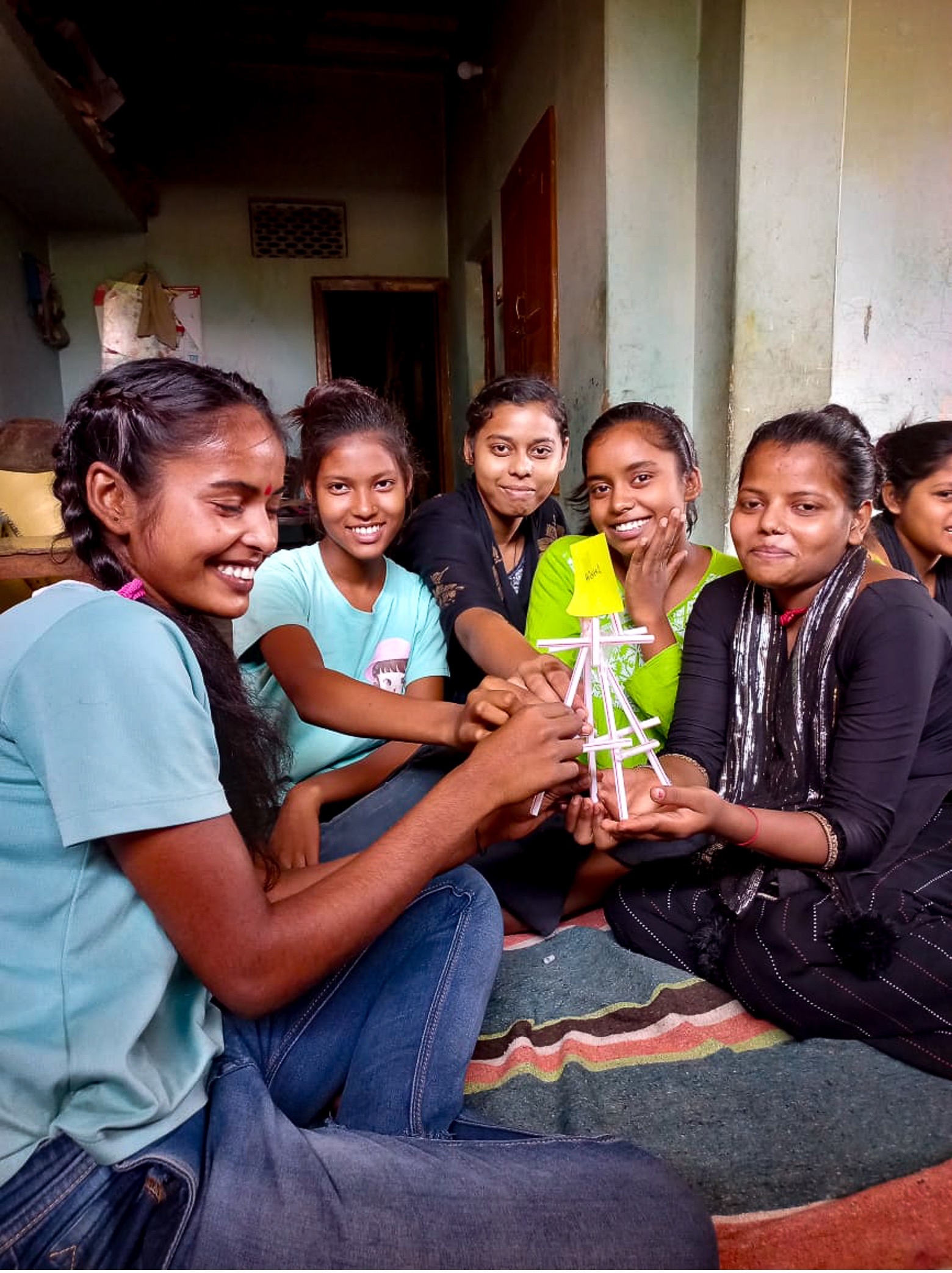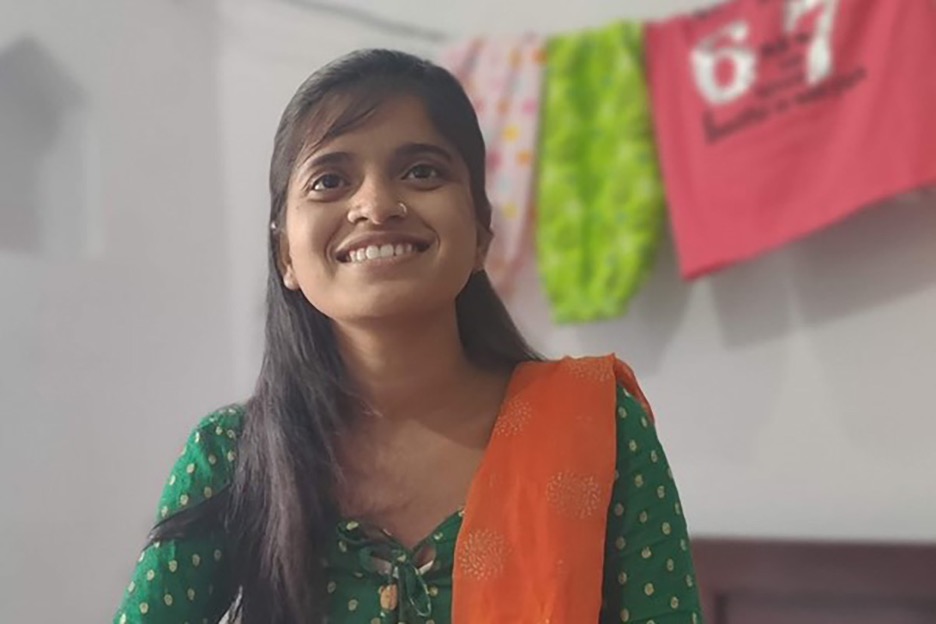Through AKF and Prince’s Trust International’s project, more than 2,600 girls in India are learning new skills and building knowledge


When she was eight months old, Annu was taken in by her grandmother. Throughout her childhood their roles shifted, and Annu spent several years shouldering the responsibility of caring for her grandmother whilst attending school.
Like many girls in her community – a peri-urban neighborhood in Patna, Bihar, northern India – her household duties came before her studies. But Annu always felt like there was something missing; she wanted to pursue a career of her own.
At school, Annu met another girl her age who told her about a place she went to learn new skills, called the Lehar Centre. Annu was curious, so she decided to enroll. She began by learning stitching – a traditional and typical trade for women across India. Whilst stitching helped her earn a modest income, Annu knew that her life was more than just needles and thread, so she joined more sessions held at the center.
“Even before joining Project Lehar, I had hopes for my future, but had no guidance to prepare myself or any confidence to take that next step,” she says. “Gradually, with the sessions in communication and negotiation, employment, time and money management, and entrepreneurial skills, my motivation grew stronger.”
Growing with confidence, Annu finally knew what she wanted to do with her life. She started studying for a computer diploma and has since been working in a customer service role at a local business, proud to be the first amongst her siblings to secure a career.

Annu has been working as a customer service clerk for almost a year
The Lehar Centre in Patna is one of two centers in India which make up the physical home of Project Lehar, an initiative of the Aga Khan Foundation (AKF) and Prince’s Trust International. Launched in 2015, Project Lehar is one of AKF’s longest-running programs. It aims to empower adolescent girls through vocational training and skills development and promote equality in their communities. The project takes a holistic approach, delivering complementary learning modules which enable girls to enhance their earning power, build self-confidence, and plan for the future.
Project Lehar operates in the states of Bihar – where Annu lives – and Uttar Pradesh, both of which see many girls dropping out of school due to several social and gender related challenges. Girls are often expected to uphold domestic responsibilities and aren’t supported to understand their rights, meaning they face unequal access and limited opportunities at almost every turn. In some cases, young women are exposed to forced or early marriage and gender-based violence. When they leave school, all these barriers present a huge challenge for finding work.
“Access to formal employment is limited, not least because of mobility and transport issues,” explains Kangkana Bordoloi, AKF’s Programme Officer for Lehar, “even when young women find jobs, it can be hard for them to keep them as they can’t afford the transport, or because family restrictions mean they can’t travel.”
Kangkana leads a close-knit team of eight who work directly with each cohort of Project Lehar participants. Embedded within the community, they have built firm, lasting relationships with families, recruiting girls by going door–to–door and consulting community leaders. The locally led team delivers courses (or support partners to do so) in community spaces and at the Lehar Centers, with one center in each state.

Door-to-door recruitment for Project Lehar

A team building activity at the Lehar Centre in Bihar
Each cohort of girls spends six transformative months with Project Lehar. As Annu’s story shows, this journey is about much more than learning to find a job. “Project Lehar works on two levels,” says Anindita Roy, International Program Manager (India and Malaysia), Prince’s Trust International. “Firstly, it supports individual young women to learn, earn and thrive, despite the barriers they face. Secondly, it empowers these young women to drive longer-term change within their families and communities, building efforts to gradually break down those barriers.”
It’s estimated that only 39 million women are employed in India’s workforce compared to 361 million men. With a booming population of 1.4 billion, this demonstrates a lack of job opportunities for everyone, yet the discrepancy reflects the huge imbalance of responsibility women carry. Worldwide, women do three times as much unpaid household work as men, limiting their time and space to build new skills, which reinforces biased gender norms present in their communities.
Project Lehar works to break this cycle, enabling young women and girls to find new paths to prosperity, in turn making a meaningful impact in their communities and showing that women have just as much potential as men.
Saraswati, an alumnus in Bihar, knows this all too well. After her father died, Saraswati’s mother set up a clothing and jewelry shop to bolster the family’s income. Much of Saraswati’s childhood was spent with her mother in the store, helping as best she could. Since joining Lehar as a teenager, her ability to support her mother has skyrocketed. In fact, inspired by entrepreneurship and business development classes, Saraswati has become the driving force behind the business.
“At first, I was very apprehensive about speaking to customers and members of my community,” she recalls. “Now, when they come to my shop, I feel very confident and find it easy to speak to them and negotiate purchases.”

Saraswati is following in her mother’s footsteps and building a brighter future for their family
Saraswati’s time with Project Lehar not only taught her the necessary skills to run a successful business, but more importantly, it enabled her to find her inner confidence. She is now an accomplished young businesswoman, regularly travelling miles from home to negotiate with wholesale suppliers.
Like Annu, Saraswati has found her stride. Guided by the dedicated local team, supported by their families, and uplifted by the camaraderie of the other girls, they are amongst 2,631 alumni who today stand as role models to many others. “Project Lehar acts as a springboard for girls’ success,” Kangkana says proudly. “The potential is within them; we just help them find it.”
Written by Kerensa Keevill